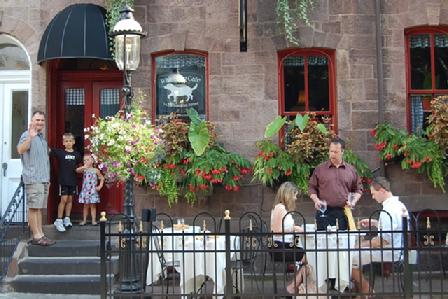In 1983 Judy Wicks started the White Dog Café in Philadelphia. It has become an exemplar for a community-based enterprise.
Where I live, community enterprise is slowly but surely being eroded as an increasing number of national or international chain stores supplant local stores. While this typically provides benefits such as cheaper goods the longer-term impacts are not beneficial for the local community (more about this in a later blog).
The White Dog Café started off as a restaurant, and remains a restaurant, but it has become the centre of a local network of suppliers, customers, employees and community interests. In the early years of the restaurant, Judy became increasingly troubled that the meat on her menu came from industrial farms. She changed to free range pork and then other meat and chicken and free range eggs. If produce is available locally, and is preferably organic, the White Dog Café purchases it in preference to imported food.
Initially Judy regarded locally sourced production as a point of difference for her restaurant, but her thinking evolved to consider the greater good and she went about engaging other restaurateurs in the concept. Her engagement with local farmers and growers created momentum for the establishment of the Fair Food initiative. Farmers and growers benefit from having a larger market for their produce locally. This animal welfare aspect of the White Dog Café remains one of her strongest motivators.
Networks of services
A restaurant depends on a web of services to operate. As Judy sorted out the produce for her menu, she became aware of a series of expanding possibilities to make the restaurant more sustainable and support the local community. She sourced renewable electricity and created a solar-heated water supply. Organic waste is composted and other waste recycled where possible. Local products are used whenever possible – for example locally produced soap is purchased for hand washing. For those products not available locally, such as tea, sugar and coffee, Fair Trade sources are used.
The invisible had works when we live in the same community.[1]
Staff also benefit from the sustainability philosophy – Judy pays a “living wage”. The Restaurant also supports a number of local community service projects such as Crime Victim Services and many others.
Business philosophy and selling the business
The mission statement of the White Dog Café is “Serving our customers, serving each other, serving our community and serving the earth”. Business decisions are based on serving the greater good, growing consciousness and increasing happiness.
After 30 years in the restaurant business Judy decided to sell the restaurant to help her focus on the promotion of sustainability. She wanted to keep the mission of the White Dog Café alive, so she found a local purchaser and retained the rights to the name of the business. To perpetuate the sustainability agenda she set up a Social Contract that keeps the White Dog Café on the same trajectory. The purchaser is able to set up other branches as long as they have 51% local ownership. This video outlines Judy’s perspectives, the restaurant’s operations and the Social Contract.
Above all, Judy has show how one business can generate social good by building rich networks in its local community. Do you know of other examples?
image credit: Real People Eat Local

